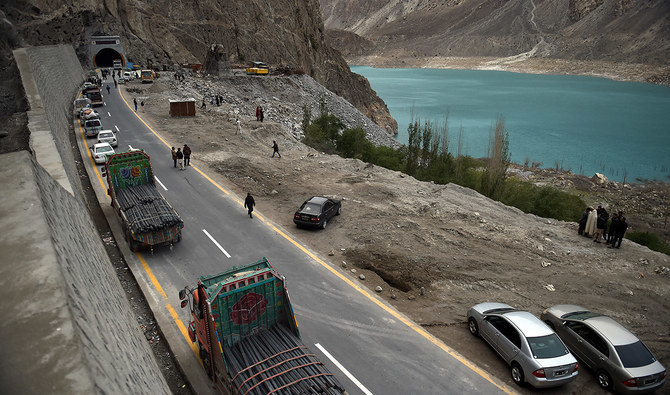KHAPLU, Gilgit-Baltistan: A sit-in protest organized by traders in the northern Gilgit-Baltistan region at an important highway connecting Pakistan to China entered its 12th day on Tuesday, causing disruption for cross-border trade and transportation as protesters vowed not to let up until the federal government reverses its decision to impose taxes on imports.
Traders on Monday blocked the entry and exit points of the Karakoram Highway (KKH) in Sost village in GB. Protesters have accused the federal government of violating a GB court order which restrained customs and Pakistan’s tax agency, the Federal Bureau of Revenue (FBR) from collecting taxes on goods imported through the Khunjerab Pass on KKH.
On July 20, the GB Chief Court declared illegal the collection of income tax, sales tax and additional sales tax by Pakistani revenue authorities on goods imported from China through the Khunjerab Pass. Accusing the government of violating the court’s orders, scores of traders have been staging a sit-in protest since July 26 near the Sost dry port.
“After 11 days of sit-in at the National Logistics Corporation’s office, now we have shifted our location to Karakorum Highway at Sost dry port,” Imran Ali, president of the GB Chamber of Commerce and Industry told Arab News over the phone.
“Now the road is blocked for all kinds of trade and traffic, and we will continue our protest unless our demands are fulfilled,” Ali vowed. “The GB government is also with us and we are also in contact with the federal government in this matter.”
Ali said over 1,500 traders are associated with the border trade, adding that they constituted a 16-member committee on August 4 which would meet GB chief minister to discuss the issue.
GB Information Minister Eman Shah admitted that trade had been suspended at the border due to the protest. He said the matter was not linked to the GB government but was a “federal subject,” adding that trade bodies’ representatives had held meetings with government officials at the Prime Minister’s Secretariat in Islamabad to discuss the matter.
“They should end the protest because this border is very important for the country,” Shah told Arab News over the phone. “Because developments of major projects are linked with this border.”
Muhammad Iqbal, president of the GB Importers and Exporters Association, said the dispute erupted in January when the border was temporarily opened to facilitate some TIRs (Transports Internationaux Routiers), an international customs transit system.
He said local traders had been exempt from income and sale taxes since 1996 but in 2024, the customs collectorate started to tax local traders. The GB Chief Court declared the move illegal, but Iqbal alleged authorities violated the order.
“Sympathies of all political, social and religious parties are with us,” he said. “And if our demand is not met, we will start a protest march from Hunza-Nagar district to the Khunjerab Pass.”
Ninety-six percent of trade between Pakistan and China consists of China’s exports to Pakistan, while Pakistan’s share of exports to China is only 4 percent, as per the Trade Development Authority of Pakistan (TDAP).
The main items imported from China into Pakistan include electronic items, shoes, garments and spare parts while Pakistan exports gemstones, dry fruits, medicinal herbs and some clothing items to the neighboring country.
Bakhtiar Muhammad, an FBR spokesperson said the GB court will conduct a hearing into the matter on Tuesday.
“If the court decides in favor of importers, the decision will be implemented,” he said. “In case the decision is in the department’s favor, the same shall also be implemented. Either way, the protest will hopefully end as their main demand is to implement the GB court decision.”












